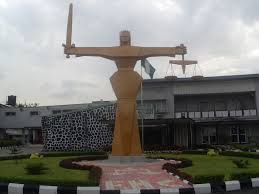
THERE justice can be bought and sold cannot be called the temple of justice. It may be more appropriately labelled as the market of justice. A temple is not a place for buying and selling, except for those who are controlled by market forces.
The temple concept is at the core of the justice business, which is not to suggest that justice delivery is a business activity. But when the pure idea is corrupted by impurities and justice becomes buyable and sellable, the business side prevails to the detriment of justice.
This is the picture as lawyers and judges in the country collectively face an ironic public trial on account of the spotlight on the putrefying underbelly of their work.
It is a sign of the times that some lawyers, provoked by group stigmatisation, have formed a collective of “Concerned Lawyers” to reject the stigma. The lawyers, led by activist lawyer Femi Falana (SAN), on February 18 took their case to the Lagos office of the Economic and Financial Crimes Commission (EFCC) where they were received by EFCC Chairman Ibrahim Magu.
Interestingly, Falana said to Magu: “We also want to urge you to beware not to fall into the fallacy of generalisation. There are bad lawyers and judges, but there are also good ones.” This logic is understandable, but perhaps the greater logic is that justice is too important to be left to the logic of good and bad. In other words, although the categorisation may be considered a fact of life, there should be no place for bad lawyers and judges in the temple of justice.
Falana continued: “We are embarrassed by a few of our privileged colleagues who bribe judges, talk to them behind doors to pervert justice…We have a duty to this country as ministers in the temple of justice.”
When a temple is corrupted by unholiness, there are unholy consequences. A portrait of corruption in the temple of justice was painted by no less a person than the Chairman, Presidential Advisory Committee on Anti-Corruption War, Prof. Itse Sagay (SAN), in a recent interview.
Sagay said: “When we talk of the judiciary, we are talking of judges. As far as I am concerned, the judiciary is not the most blameworthy. That is the truth of the matter. The most blameworthy are senior lawyers – a number of senior advocates who have made it a speciality; who have developed particular skills to kill corruption cases so that their clients, after many years of delays and frustrations of prosecution, end up going away with their loot. And such lawyers, of course, share in the proceeds of crime. They get a part of the loot and that is why you see them buying private jets and so on. That amount of money from the proceeds of crime has completely blunted their consciences and they are as active as the accused persons – the looters – in trying to protect the loot because part of the loot now belongs to them by association.”
Sagay added: “What I am saying, therefore, is that this is where it starts. These are the people who carry huge sums of money behind chambers to judges. They are the ones who corrupt judges. Really, if the struggle is going to be effective, we have to mark down the lawyers who are behind all these, not just judges. In fact, there are some retired judges too that are in the game. They are called consultants and they carry huge sums of money to their juniors they left behind in the judiciary and use their influence to get them to simply abandon justice and do the bidding of corrupt persons. It is a very serious situation. But, as I said, the very first port of call would be the lawyers that are behind it. Right now, they are doing it without control; they are doing it without consequences…”
Relevant to this background, and perhaps a momentous test case, is the ongoing drama involving Lagos lawyer Ricky Tarfa (SAN) who is accused of willfully obstructing two officers of the EFCC, Moses Awolusi and Sanusi Mohammed, from arresting Gnanhoue Sourou and Nazaire Odeste, Benin Republic nationals suspected to have committed economic and financial crimes. Also, and perhaps more significantly, Tarfa is alleged to have engaged in improper communication with Justice M. N. Yunusa of the Federal High Court, Lagos, and said to have sent money to him, while the case between the EFCC and two others was pending before the judge.
Even more damaging is the EFFC’s allegation that Tarfa’s law firm made a habit of asking the Chief Registrar of the Lagos Judicial Division of the Federal High Court to assign his cases to Justice M. N. Yunusa, suggesting an unseemly rapport between him and the particular judge.
Imagine a defence team made up of 99 lawyers, including 32 Senior Advocates of Nigeria (SAN). This curiously large team of defenders of Tarfa was announced at a Lagos High Court in Igbosere on February 16. Was the intention to intimidate the judge with an army of lawyers, senior and not-so-senior? The trial judge reportedly “bemoaned the number of counsel” in court for the defendant. She also noted that there was no need for such mega support which she interpreted as harassment and intimidation of the court. The judge’s observation is thought-provoking.
There is no doubt that lawyers and judges have a defining duty to keep the temple of justice sacred. When the temple’s sacredness is desecrated, it is the beginning of the end not only for the temple but also for the society that depends on the temple for justice.
There is no room for bad eggs in the temple of justice, and there is no argument for their accommodation. Justice is so socially pivotal that its devaluation is a societal minus; and the temple of justice should be so morally unassailable that only good eggs are allowable.
NATION
END

Be the first to comment